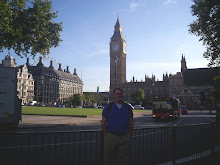President Obama accomplished the rare feat of accepting the the Nobel Peace Prize while in the process of escalating a war. The President used this occasion to
articulate his particular interpretation of the "just war" theory.
He starts by acknowledging his debt to Martin Luther King but also says that as President he can't "be guided by their [King's and Ghandi's] example alone." Fair enough. However, I wonder if King's words about his country being the largest purveyor of violence in the world makes any impact on Obama's view point. Obama is right is that there is nothing naive or passive in King's methods but I wish Obama also recognized that King was spot-on in his view of the U.S. It appears that Obama's position limits his ability to see.
To defend the idea of 'just war," Obama states "a non violent movement cold not have stopped Hitler's armies." Pulling out the Hitler card is a cheap sot by the President; especially by cherry picking the date. A non-violent movement could not have stopped Hitler on September 1, 1939 or on June 6, 1944. However, Hitler did not come from out of nowhere. Hitler had been a force since the early 1930's and a non-violent movement might well have stopped at an earlier date.
Obama's big idea is that it is possible to fight a war on humanitarian grounds. I believe the President is sadly mistaken. First, when a country decides to go to war it makes a decision to commit resources that would be allocated in a different manner towards the war. The New Deal died at the hands of World War 2; President Franklin Roosevelt admitted as much when he had Dr. New Deal give way to Dr. Win the War. President Johnson's Great Society died at the hands of the Vietnam War. With a military budget of nearly 670 billion dollars, it is worth asking what kind of humanitarian projects at home are being starved at the expense of our war machine. What kind of humanitarian action continue to allow millions of people to go without health insurance or only sluggishly attempts to address the fact that 1o% of Americans are unemployed.
During his speech, Obama continually cites the war in Afghanistan as an example of the kind of war the fits into his paradigm. It's hard to see how that can be the case. Obama calls the war in Afrghanistan a "war we did not seek." This is a limited view of what precipitated the U.S. invasion of Afghanistan. There is nothing in the 9/11 attacks that made a military response inevitable or necessary. the attacks on Pearl Harbor, which are the closest cousin to 9/11, were a strictly military attack. The Japanese Navy attacked U.S. military installations in the Hawaii. The surprise and shock of the attack does not diminish the military nature of December 7, 1941. 9/11 was not a military attack and should be viewed as a crime against humanity. Nothing suggests that a military response was required. Instead an international law enforcement effort could have accomplished much of the same thing. When the use of Guantanamo, black sites, and the Prison at Bagram are factored in it is impossible to see the military solution as being in any way "humanitarian."
Obama does touch on some meaningful goals. He continues to tout the idea of complete nuclear disarmament and the idea of diplomacy with unfriendly nations. However, I find myself disapointed with Obama's address. He speaks to having to dal with the world the way it is and I understand that. However, part of engaging and changing the world is changing the tools we use to engage the world. President Obama inherited a way of engaging the world that was strongly biased toward the military. Instead of siezing the opportunity to change out direction, Obama chose to embrace and defend it.





